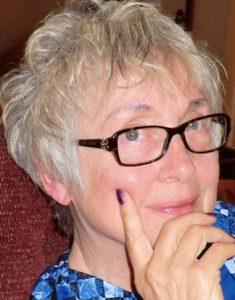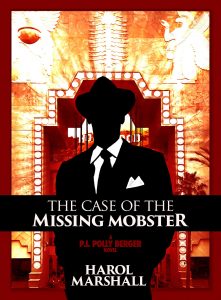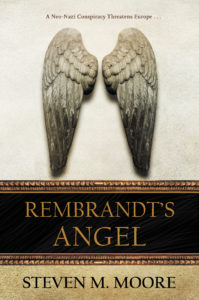Interviewing author Harol Marshall…
Steve: I have the pleasure today of interviewing author Harol Marshall who writes in the mystery and political thriller genres. Without further ado, why don’t you tell us a bit about yourself, Harol.

Harol: My father named me after his brother and dropped the ‘d’ from Harold, so I’m a female! I grew up in Upstate New York where my father was deputy chief of police in my town. No doubt as a consequence of all the stories I heard growing up, I write novels in those genres, as well as short stories, some of which you can read on my website: http://www.harolmarshall.com. My contact email is: harolmarsh at gmail dot com. I also have a Harol Marshall Facebook page and Amazon page.

Steve: Can you describe some of your books for the readers?
Harol: I’ve published four books in my PI Polly Berger series, the titles of which begin with, The Case of the, and include: Catwalk Saint, Vanishing Chef, Trophy Wife, and Missing Mobster. The second edition of my first thriller, The Shadow Cabinet, came out last year, and The Singapore Assassin (second edition – the link is to the first) is due out this year from Black Opal Books, as well as the three books in my Mexico series: A Corpse for Cinco de Mayo, A Corpse for the Matadora, and A Corpse for Cortez. The protagonist is a police commander and head of the homicide division in the Tlaxcala State Police. I also have a stand-alone mystery, Adieu at the Zoo, and a short story anthology, Growing up with Pigs. I’m married and live in Greensboro, North Carolina, with my husband and three wily cats. My husband and I share four children and four grandchildren.
Harol on reading and writing:
Steve: Why, how, and when did you start writing?
Harol: I was an avid reader from an early age, but became interested in writing in high school, thanks to a really great English teacher. However, most of my writing over the years has been in the academic field until I retired, which is when I began writing fiction.
Steve: Did you publish the first book you wrote?
Harol: Yes, with a vanity press. That book has been rewritten and a new edition will be coming out later this year.
Steve: What is your biggest problem with the writing process?
Harol: I seldom experience writer’s block, but I do suffer occasionally from “plot block.” To tackle the problem, I work on two or three books at a time. When I’m blocked on one, I move on to another until I solve my plot issues.
Steve: Do you feel writing is something you need to do or want to do?
Harol: Writing is something I love to do.
Steve: Have your personal experiences or situations influenced you creatively?
Harol: Definitely, especially with regard to settings. My Mexico village mysteries are set in the State of Tlaxcala, where I conducted field research for my PhD dissertation in anthropology. My PI series is set in Hollywood, where my son once lived, and my zoo book is based on my experiences coordinating a research and education program between my university and the North Carolina Zoological Park.
Steve: How much of your creative ability do you think is innate and how much is learned?
Harol: I have no idea, so I’ll guess 50/50.
Steve: What is the last book you read? What are you reading now?
Harol: Right now I’m reading The Elements of Eloquence: Secrets of the Perfect Turn of Phrase, by Mark Forsyth, which I highly recommend to all writers. As for pleasure reading, I recently finished The Holographic Universe by Michael Talbot. I’m a fan of popular physics books, perhaps because I’m married to a retired particle physicist, and I’m a political junkie, so I am constantly reading articles on politics as well.
Steve: Who are your favorite authors? Whose writing inspires you the most and why?
Harol: Michael Connelly and Daniel Silva. Connelly inspires me, because his police detective and lawyer series are set in LA, like my PI series. Also, I like his straightforward writing style.
Steve: What was the last book to make you laugh? Cry?
Harol: For laughs, the one written by my son, Dale Hoffman (a former standup comic), which makes me laugh even thinking about it: Werewolf Watching in Michigan’s Upper Peninsula: A Field Guide. For crying, I can’t say, since I tend to avoid sad stories.
Steve: Should writers read in their genre? Should they be avid readers?
Harol: Yes, though I find myself reading less fiction than I did before I started writing fiction. And yes.
Steve: How do you find (discover) your plots?
Harol: On occasion, people (usually family members) give me the beginnings of a plot idea, but usually, my plots come from reading about actual crimes and criminals.
Steve: Are your characters based on real people?
Harol: I never base characters on people I know, and only occasionally on someone I’ve read or heard about. My characters are my own invention, which makes writing them easier, because they aren’t locked into characteristics apart from how I want them to look, think, feel, and act.
Steve: How do you name your characters?
Harol: Sometimes I google names, other times I’ve taken a name from someone I know, usually a family member (solely for the purpose of amusing myself).
Steve: Which comes first for you, plot or characters?
Harol: I start with a plot, and characters follow.
Steve: Any comments about writing dialog?
Harol: I love writing dialog, and I’m better at dialog than description. I find I can move a story along easier using dialog, and since readers interpret dialog as ‘action,’ I’m saved from having to invent unnecessary action scenes. Often, when writing dialog, I read the words aloud to ensure they sound right. The secret to writing dialog, I believe, is to be a good listener, and pay attention not only to what people say, but how they say it. I’ve always been good at recalling conversations, sometimes verbatim, so writing dialog seems to come naturally to me.
Steve: How do you handle POV?
Harol: I write my PI Polly Berger books in first person point of view, which can be challenging when writing a mystery because the reader can only know what Polly knows or learns. On the other hand, the books are driven by how she thinks, analyzes, works, and behaves. The people with whom she interacts, and the how and why of her life choices, are critical to the story, so first person POV works best. By contrast, I write my thrillers, and the Mexican village mysteries, in third person because the stories revolve around a number of different settings and characters, some of whom are almost as important as the protagonist.
Steve: Do you do fact-finding for (aka research) your books? If so, how? What sources do you use?
Harol: Definitely. I spend a lot of time reading, and of course, googling all kinds of things, and I have a number of books on topics of interest, including police procedures, the FBI, and the CIA. I also once took a deputy sheriff’s course, offered by our sheriff’s department, that included a session with a virtual police firearm training system. The leader congratulated me for telling the perp in the video to “put the baby down.” He claimed most of the men in the course said, “drop the baby.”
Steve: What reference works do you use most?
Harol: I’ve used a number of reference works on writing, including King’s On Writing, Karen Wiesner’s Writing the Fiction Series, Robert’s Rules of Writing, We Wanted to Be Writers (from the Iowa Writers’ Workshop), and more. I’m always on the lookout for new sources, like the book on eloquence that I’m reading now.
Harol on the Writing Business:
Steve: Do you use a formatter? Editor? Agent?
Harol: No, no, and no.
Steve: Do you self-publish or traditionally publish?
Harol: I self-published in the beginning, but only have one self-published book at the moment, my short story anthology. I have no plans to self-publish again.
Steve: What are your most effective marketing techniques?
Harol: I’m terrible at marketing, and dislike it intensely, probably because I’m a major introvert. However, I have resolved to do a better job, starting with interviews like this one (thanks, Steve!). [Steve: You’re welcome…and my pleasure.]
Steve: What do you think of publishing services like Amazon, Smashwords, etc? What about small presses v. large, traditional publishers?
Harol: I’d rather refrain from saying what I think of either Amazon or Smashwords. As for small presses, they are the heroes of the writing world in my view, though I wish they could afford to do more marketing for their writers. That’s the advantage of being published by large publishers—they can afford to market the books they publish. [Steve: For some of their authors.]
Steve: Do you want to include a snippet of prose from one of your books? What does it illustrate that you find important for readers to know?
Harol: These words from my most recent PI Polly Berger book, The Case of the Missing Mobster, typify Polly and the books: “I’m a private investigator, Pauline Isabel Berger, a P.I. in name as well as occupation. My agency, Berger Investigative Services, Inc. is located in beautiful downtown Hollywood, on the wrong side of the tracks, but the right side of the law. Private investigators in general have a dicey reputation, so I work hard to maintain high professional standards, which isn’t easy when you live and work in the land of false promises and broken dreams.” [Note from Steve: I review this book tomorrow.]
Personal questions for Harol:
Steve: What is your favorite place to eat out? Favorite food? Drink?
Harol: My favorite restaurants are Thai or authentic Chinese, followed by Italian and Mexican. However, if I were stranded on a desert island and could only have two foods, I’d bring along lobster and spaghetti with red clam sauce. I’m not much of a drinker, but my favorite mixed drink is a caipirinha, which is made with lime juice, sugar, and cachaça, a Brazilian rum.
Steve: What are your favorite other places, either here or abroad? What places would you like to visit?
Harol: My favorite places in this country are the cities and towns where my family members live. Abroad, my favorites are England (my mother’s birthplace), Mexico, and Singapore. I’ve never been to Hawaii, but my husband has promised a trip there for my next birthday. [Steve: Ha! Make him read this interview.]
Steve: What other interests and activities do you have besides writing?
Harol: I love to dance, and we go dancing every week. I also belong to a ladies hip-hop class that meets weekly and performs every year at our dance school’s annual show. I also like crossword puzzles and have recently begun constructing crosswords—not easy, but for me, more fun than solving other people’s puzzles.
Steve: If your book(s) were to be made into a movie, who would you want to play your main characters?
Harol: My books would make better TV series than movies, and if that ever happened, I’d leave the choice of actors up to the casting directors. However, I’d have to insist that the actor playing Commander Cortez be a handsome Hispanic with captivating green eyes.
Steve: If you could trade places with someone for a week, famous or not, living or dead, real or fictional, with whom would it be?
Harol: Probably Amal Clooney, just so I could spend a week with George.
Steve: Thanks, Harol, for your interesting and candid answers today. Readers, please check out Harol’s novels and visit her website http://www.harolmarshall.com to learn more about this interesting author.
***
Comments are always welcome.
Rembrandt’s Angel. Scotland Yard Inspector and ex-MI6 agent Esther Brookstone works in the Yard’s Art and Antiques Division. She becomes obsessed with recovering a Rembrandt painting stolen by the Nazis in World War II. Her paramour, Interpol agent Bastiann van Coevorden, tries to control that obsession and keep her safe. The quest for the painting leads to an international conspiracy that threatens Europe. Available in print and ebook format from Amazon and in ebook format from Smashwords and its affiliated retailers (iBooks, B&N, Kobo, etc.). The sequel Son of Thunder will soon be published…also from Penmore Press.

Around the world and to the stars! In libris libertas!

July 4th, 2019 at 11:56 am
I enjoyed his interview. I wondered about the name Harol and got the answer. This author can use her true name and still have readers not know from the name if the author is male or female. It’s a unique name. I love Robert Parker books, so that was a good comparison for me to get a flavor for this one. Thank you.